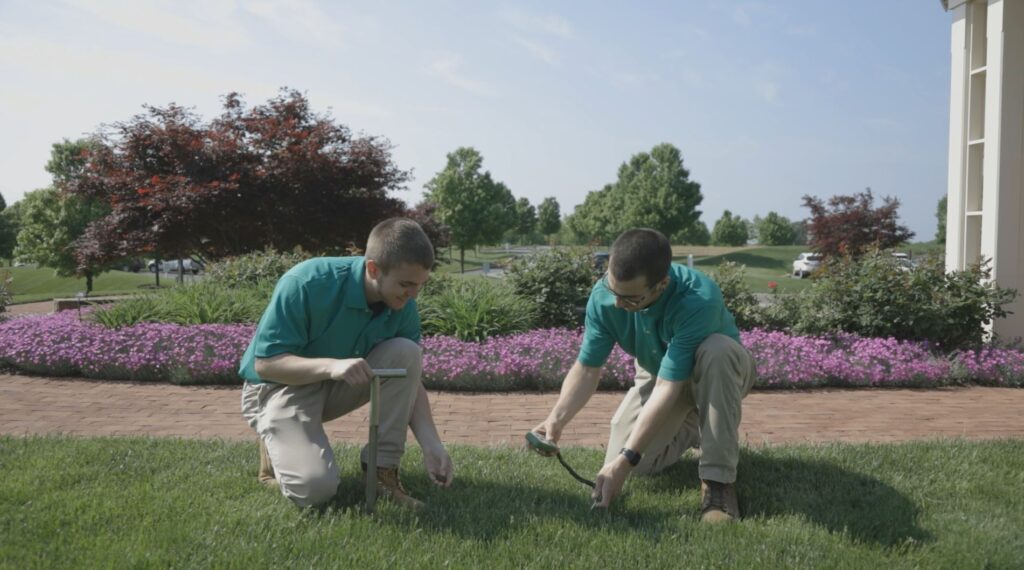When asked, “What do you look for in a potential job applicant,” we think not only of those who have landscaping experience, but those whose different skills and interests might apply to the work we do. This is important because we know that people who are able to apply their passions to their profession are happier and more likely to stay on as long-term employees. Landscape professionals draw from a wide array of knowledge, from science and math to business and communications, to do their jobs well. We encourage people to think outside the box when they consider their place in the landscape industry because there are a wide variety of positions and opportunities to apply their interests. One area of interest that translates well to the landscape industry is science.
Most landscape professionals whose work takes them into the field—crewmembers, field managers, area managers, etc.—use their scientific knowledge in the fields of horticulture, botany/biology and chemistry on an almost daily basis. After all, our overarching goal is to look after plant health and the well-being of healthy landscapes. When a plant isn’t doing well, our crew members need to understand why—extreme weather, pests, disease, or environmental changes—and determine if it’s something they have in their power to change.
 Field Manager Katie Rose (BAM) notes, “I was really interested in science, especially biology, in high school. Although what we do may not seem like we are diving into science, we are using the biology of the plant material every day. For example, if you have a trouble location, like a more wet area on site, certain plants thrive in that environment, while other won’t last.” As a field manager, part of Katie’s job is to identify existing plants that may be failing and suggest a solution or replacement species that will be better suited to the present conditions.
Field Manager Katie Rose (BAM) notes, “I was really interested in science, especially biology, in high school. Although what we do may not seem like we are diving into science, we are using the biology of the plant material every day. For example, if you have a trouble location, like a more wet area on site, certain plants thrive in that environment, while other won’t last.” As a field manager, part of Katie’s job is to identify existing plants that may be failing and suggest a solution or replacement species that will be better suited to the present conditions.
 Katie adds, “We also use chemicals to control weeds and pests, and the chemical mixture matters to overall plant health.” Chemistry is a vital part of the equation (pardon the pun) because we must be able to accurately measure the soil and mix chemical compounds to create specific treatment applications. For example, our crews use a tool called a soil probe to measure the pH balance. The desired pH range, at which nutrients in the soil solution are most readily available to the plant, is 6.0 to 7.0. If pH levels are low, we would apply lime to raise the pH, and if levels were high, we would consider elemental sulfur to lower the pH. Another key example is the specific kind of fuel we use in all of our two-cycle equipment (line trimmers, leaf blowers and edgers). This carefully calculated mix of gasoline and two-cycle engine oil ensures our equipment is running at its optimal level, whereas a wrong calculation or combination of the wrong fuels might cause equipment to fail or effect its longevity.
Katie adds, “We also use chemicals to control weeds and pests, and the chemical mixture matters to overall plant health.” Chemistry is a vital part of the equation (pardon the pun) because we must be able to accurately measure the soil and mix chemical compounds to create specific treatment applications. For example, our crews use a tool called a soil probe to measure the pH balance. The desired pH range, at which nutrients in the soil solution are most readily available to the plant, is 6.0 to 7.0. If pH levels are low, we would apply lime to raise the pH, and if levels were high, we would consider elemental sulfur to lower the pH. Another key example is the specific kind of fuel we use in all of our two-cycle equipment (line trimmers, leaf blowers and edgers). This carefully calculated mix of gasoline and two-cycle engine oil ensures our equipment is running at its optimal level, whereas a wrong calculation or combination of the wrong fuels might cause equipment to fail or effect its longevity.
If you’re interested in using your love of science to beautify landscapes and benefit the environment, consider joining the landscape industry. You can test the waters with our internship program, attend one of our campus recruiting or career fair events to speak with a Ruppert representative about their experience, or if you’re ready to jump right in, apply online today via our careers page.